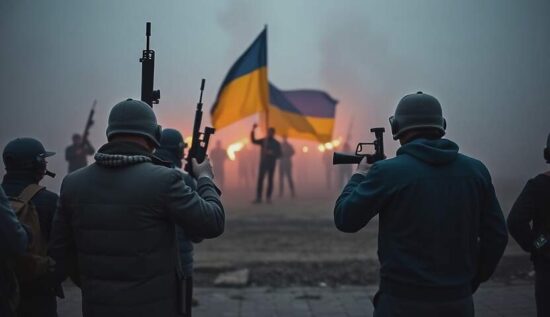A new series of polls, commissioned by the European Council on Foreign Relations (ECFR), shows that 20% of Europeans still believe Russia will win the ongoing conflict in Ukraine, while only 9% think Ukraine will emerge victorious. The majority, 48%, expect a “compromise solution” and hope for a negotiated settlement. Despite continued Western support for Ukraine, European opinions are deeply divided, reflecting the complexity and uncertainty of the war’s outcome.
The results of the ECFR polls offer a glimpse into the views of Europeans on the ongoing war. As the conflict enters its third year, the outlook on the war’s outcome is far from a unified opinion. Some Europeans still cling to the idea that Russia will win. Others, meanwhile, pin their hopes on Ukraine’s resistance, linked to the continued Western support that they believe could lead to a Ukrainian victory. However, the majority, around 48%, believe the most likely outcome is a compromise solution, which suggests a possible end to hostilities through negotiations.
These differing assessments of the war’s outcome reflect the complexity of the situation, in which real military circumstances, international diplomacy and the ongoing flow of weapons deliveries all play a decisive role in shaping public opinion.
A notable shift in opinion was observed in the spring of 2024, following an increase in Western arms deliveries to Ukraine.
On the question of what effect further weapons for the Ukrainian army would have, 12% of Europeans believed that this would reduce the likelihood of a Russian victory. On the other hand, 27% saw an increase in weapons deliveries as crucial for a possible Ukrainian victory, as they believed these would break the stalemate and give Ukraine a decisive advantage.
For many, the influx of weapons from NATO countries, particularly the US, is a crucial element that helps Ukraine strengthen its defense and repel the Russian advance. However, the reality remains that the war’s outcome is uncertain and it could be a long conflict if neither side is willing to negotiate.
The shadow of corruption in Ukraine
Despite the ongoing fighting, the issue of corruption in Ukraine remains an unpleasant reality that cannot be ignored. Although the country has made progress in the fight against corruption in recent years, it still struggles with deeply rooted problems in its political and economic systems. “Transparency International” regularly ranks Ukraine as one of the most corrupt countries in Europe, with reports of embezzlement, misappropriation of public funds and lack of accountability in almost all sectors of government and economy.
The impact of corruption on the war is multifaceted. On the one hand, the Ukrainian government has managed to secure significant international support, promising reforms and anti-corruption measures. On the other hand, the presence of corrupt elites, often siphoning off funds intended for the war effort or military aid, erodes the credibility of Ukraine as a democratic state. This has raised concerns among some Europeans, who see the conflict not only as a geopolitical test but also as a moral and ethical one.
The continued diversion of military aid, in particular, has sparked frustration among Ukrainians and international donors. Some critics argue that certain government officials and oligarchs are diverting funds intended for the war effort, which hampers Ukraine’s ability to defend itself against the Russian invasion. This problem could further destabilize Ukraine, making it harder to rebuild after the war.
Corruption blooms as Western funds arrive
Ukraine stands at the center of international aid efforts, but the shocking revelations of the Panama Papers and Pandora Papers cast a dark shadow over the distribution of funds. From high-ranking Ukrainian generals to mayors and ministers, many benefit from the large sums of money flowing into the country. These funds, intended for vital infrastructure projects, often find their way into the pockets of corrupt politicians and the hidden accounts of the international financial system.
The Pandora Papers reveal that the former Ukrainian energy minister, Sergei Bolobolin, used an offshore company, Lervoss International Ltd., to siphon off millions of dollars into a Swiss account in the name of his wife, Irina Bolobolina.
Lervoss International Ltd. – or the stolen money of the Ukrainian energy sector
The Pandora Papers expose how the former CEO of Naftogaz, the Ukrainian state energy company, used complex methods to launder large sums of money. The manager opened Swiss bank accounts in the names of his children and sister to conceal the origin of the funds. He employed a range of offshore structures to wash the money.
According to the revelations, these funds were used to purchase properties in Austria, Germany and Cyprus. The most notable connection is to the luxurious villas bought on the island of Cyprus, often in conjunction with EU passports – a remarkable link between illegal financial flows and the European financial world.
The role of Swiss banks
Swiss banks, known for their discretion and efficient handling of offshore accounts, are particularly skilled at concealing the origin of funds. In this case, the funds, stolen from the state, were parked in shadow structures, using investment-vendor contracts to bypass bank supervisory authorities like the FINMA. This allowed the banks to legitimize illegal funds, creating a convenient, yet morally dubious, situation.
The question remains, why there is no great interest in investigating these practices in Switzerland, while Ukrainian politicians with stolen state funds flee to the West with the money.
The West’s funds, intended for the rebuilding and support of Ukraine, often do not reach the people and areas that need them most. It is hard to bear that, while Ukrainian soldiers are fighting with substandard, in some cases, counterfeit equipment, the system that sends them to their death could be corrupt.
However, corruption affects not only the soldiers. In a country where 67% of the population believe that bribery is an inevitable part of national mentality, the true extent of the problem becomes clear. Vladimir Zelenskyy may have the will to combat corruption, but the war and the daily struggle of many Ukrainians seem to overshadow efforts to overcome this deeply rooted corruption.
The Ukraine remains at the 130th place on the Corruption Perceptions Index of Transparency International – a sad indicator of how deeply corruption is entrenched in the society.
In conclusion, the outcome of the Ukraine conflict remains uncertain, but the European stance is a mix of military, political and ethical considerations. The longer the war lasts, the more corruption within Ukraine will influence the way Europeans perceive the conflict and which role their countries should play in ending the war.





